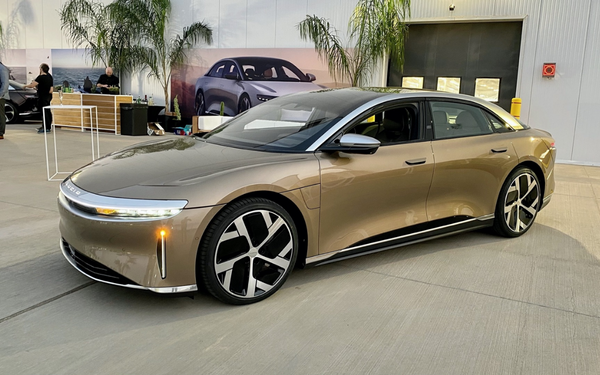The publicly listed electric vehicle manufacturer Lucid Motors is gearing itself for entry into China by hiring in the world’s largest EV market.
According to LinkedIn postings, the California-based automaker is hiring for a dozen roles in China’s commercial capital of Shanghai. Jobs in software development, public policy, design, supply chain management, and marketing and sales are all included. According to the sort of staff it is assembling, Lucid is more likely to import automobiles to China than to produce domestically, like Tesla does.
TechCrunch has contacted Lucid in an attempt to learn more about the company’s plans to expand into China.
It appears that the company’s growth in China is just getting started. A product manager is needed to “identify consumer demands in [the] larger China area, derive relevant insights, and prioritise features,” among other tasks. The company is looking for someone to develop a “go-to-market strategy for home charging in China” and figure out the charging infrastructure in the nation. It’s looking for someone with experience in localization in branding, marketing, user experience design, and Android programming.
Furthermore, Lucid is looking to hire supply chain managers in Shanghai. The company has been sourcing from China, using companies like Shenzhen-based lidar provider Robosense in its U.S.-bound vehicles, but establishing a representative there should make sourcing and communicating with such companies much simpler.
Hiring a director of public policy is crucial yet challenging. This individual will “work with Global Head of Public Policy and MD – China, sales, marketing, tax, supply chain and product teams to execute political and regulatory strategy benefiting Lucid’s business in China” and serve as the “main point of contact for Chinese government entities at both the national level and with provincial/city/district governments.”
Foreign technology companies who have attempted to enter China are well aware of the challenges that come with doing business there. However, in order to promote healthy competition and innovation, the government has opened its gates to international competitors in industries like electric vehicles.
Tesla’s Giga Shanghai is the most recent and impressive success story, since it took just one year to go from the beginning of construction to the beginning of production. Giga Shanghai, Tesla’s biggest EV factory, is located in China, which has become not only a major source of income but also a crucial manufacturing base. This promotion of Tesla’s China captain Tom Zhu to lead the company’s future Gigafactory Austin comes as no surprise.
There’s a lot of potential in China, but Lucid will have to fight to make it there. In addition to Tesla, there are a number of homegrown companies in the country’s EV industry. These include veteran automaker BYD and venture-backed upstarts like Xpeng and Nio, both of whom are looking to Europe as a way to diversify their income sources.
Because of its high price tag, Lucid will have a small market in China. A cheaper version of the Model Y, manufactured in Shanghai, was a popular seller, and Tesla was able to carve out additional economical product lines for the market. Sport utility electric vehicles were previously available for less than 300,000 yuan, or around $43,000, thanks to government subsidies. After subsidy cuts, Tesla lowered prices in China by much to 9 percent to compete with domestic manufacturers.
In comparison, the initial price of the Lucid Air Pure in Germany and the Netherlands is estimated to be approximately €100,000 ($106,000). Customers must also pay an import tax if Lucid actually ships vehicles from the United States to China.
Maybe Lucid wants a factory in China so it can compete on price. The question is whether or not the corporation has the resources and political connections to successfully run a local facility halfway around the world. In November of last year, CEO and CTO Peter Rawlinson did declare that the automaker will have facilities in China and the Middle East before the middle of the decade. Lucid, which said in August that it will again reduce production objectives due to “exceptional supply chain and logistics constraints,” could find relief in China’s skilled manufacturing.

Subtly charming pop culture geek. Amateur analyst. Freelance tv buff. Coffee lover
